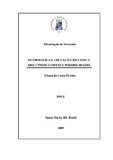| dc.creator | Menezes, Eliana da Costa Pereira de | |
| dc.date.accessioned | 2008-01-28 | |
| dc.date.available | 2008-01-28 | |
| dc.date.issued | 2005-03-30 | |
| dc.identifier.citation | MENEZES, Eliana da Costa Pereira de. COMPUTER AND INCLUSIVE EDUCATION: DISCUSSING LIMITS AND FEASIBILITY. 2005. 165 f. Dissertação (Mestrado em Educação) - Universidade Federal de Santa Maria, Santa Maria, 2005. | por |
| dc.identifier.uri | http://repositorio.ufsm.br/handle/1/6792 | |
| dc.description.abstract | Within the themes present in worldwide discussions on education, we can currently go over the matter of the use of computer in education and the process of inclusion of students with Special Educational Needs (SENs) in regular teaching. There is constant discussion about the articulation between education and computer education for the development of an effective pedagogical practice, linked to the interests of most students and able to make feasible the overcoming of limits by the students with special educational needs Facing this reality, the following research was made, aimed at identifying how computer technology has been used by SENs' teachers in the regular teaching in Santa Maria/RS. Trying to comprehend what focus the computer can and has been used in the process of inclusion of such students, analyzing what methodologies and educational conceptions give support to the performance of the teachers before the aforementioned technology. For the data collection, there were semi-structured interviews with five teachers of four schools of regular public teaching in Santa Maria, besides a trainer teacher of the Núcleo de Tecnologia Educacional (NTE) of the city. Searching for coherence during the investigative period, but, mainly for going over an area in which the subjective aspects are purposeful, the collected data analyses were made by the quantitative approach. We conclude that despite the existing hindrances and the necessity of overcoming them in mid-term, the way in which the educational computer use is being conceived and used by teachers who have students with SENs enables the inclusion of such students. Even presenting significant limitations, the interviewed teachers' pedagogical practices are enabling all the students, with or without SENs, activities using the computer. In this way, even if the subject learning is not being directly improved, we believe that the use of computers in a democratic, equal and non-excluding way gives the students with SENs the development of autonomy, self-esteem, and social and cognitive aspects of development, which enable these students to feel part of the group, ameliorating their isolation and allowing them to interact with their classmates. | eng |
| dc.description.sponsorship | Coordenação de Aperfeiçoamento de Pessoal de Nível Superior | |
| dc.format | application/pdf | por |
| dc.language | por | por |
| dc.publisher | Universidade Federal de Santa Maria | por |
| dc.rights | Acesso Aberto | por |
| dc.subject | Educação | por |
| dc.subject | Educação especial | por |
| dc.subject | Inclusão social | por |
| dc.subject | Informática | por |
| dc.subject | Educação inclusiva | por |
| dc.title | Informática e educação inclusiva: discutindo limites e possibilidades | por |
| dc.title.alternative | Computer and inclusive education: discussing limits and feasibility | eng |
| dc.type | Dissertação | por |
| dc.description.resumo | Dentre os temas presentes nas discussões mundiais sobre educação, atualmente, encontramos a questão da utilização da Informática na educação e o processo de inclusão de alunos com Necessidades Educacionais Especiais (NEEs) na rede regular de ensino. Fala-se constantemente na necessidade de articulação entre Educação e Informática para o desenvolvimento de uma efetiva prática pedagógica, conectada com os interesses da maioria dos alunos e capaz de possibilitar a superação de limites pelos alunos com NEEs. Diante dessa realidade, realizamos a presente pesquisa, tendo como objetivos identificar como a tecnologia computacional tem sido utilizada pelos professores de alunos com NEEs incluídos na rede regular de ensino do município de Santa Maria/RS, com intuito de compreender sob que enfoque o computador pode e está sendo utilizado no processo de inclusão desses alunos, procurando analisar quais metodologias e concepções educacionais embasam a atuação dos professores frente à referida tecnologia. Para a coleta dos dados, utilizamos entrevistas semi-estruturadas com cinco professores de quatro escolas da rede regular de ensino público de Santa Maria, além de uma professora multiplicadora do Núcleo de Tecnologia Educacional (NTE) do referido município. Na busca de coerência durante o percurso investigativo, mas, principalmente, por estarmos caminhando em uma área em que os aspectos subjetivos são determinantes, a análise dos dados coletados foi feita sob a abordagem qualitativa. Constatamos com este estudo que apesar dos obstáculos existentes e que precisam ser superados em médio prazo, a forma como a Informática Educativa está sendo concebida e utilizada pelos professores com os alunos que possuem NEEs favorece o processo de inclusão desses alunos. Ainda que apresente significativas limitações, a prática pedagógica dos professores entrevistados está possibilitando que todos os seus alunos, tenham eles ou não NEEs, vivenciem atividades frente ao computador. Nesse sentido, mesmo que a aprendizagem de conteúdos não seja diretamente favorecida, acreditamos que o uso do computador de forma democrática, igualitária e não excludente proporciona aos alunos com NEEs em processo de inclusão o desenvolvimento da autonomia, da auto-estima, de aspectos sociais e cognitivos do desenvolvimento, que por sua vez possibilitam que esses alunos sintam-se parte integrante dessa turma, rompendo com processos de isolamento e permitindo que eles possam interagir com seus colegas. | por |
| dc.contributor.advisor1 | Freitas, Soraia Napoleão | |
| dc.contributor.advisor1Lattes | http://lattes.cnpq.br/8605918251808106 | por |
| dc.contributor.referee1 | Munhóz, Maria Alcione | |
| dc.contributor.referee1Lattes | http://lattes.cnpq.br/8152442171177224 | por |
| dc.contributor.referee2 | Schlünzen, Elisa Tomoe Moriya | |
| dc.contributor.referee2Lattes | http://lattes.cnpq.br/7346754405819238 | por |
| dc.creator.Lattes | http://lattes.cnpq.br/5996369654576945 | por |
| dc.publisher.country | BR | por |
| dc.publisher.department | Educação | por |
| dc.publisher.initials | UFSM | por |
| dc.publisher.program | Programa de Pós-Graduação em Educação | por |
| dc.subject.cnpq | CNPQ::CIENCIAS HUMANAS::EDUCACAO | por |


